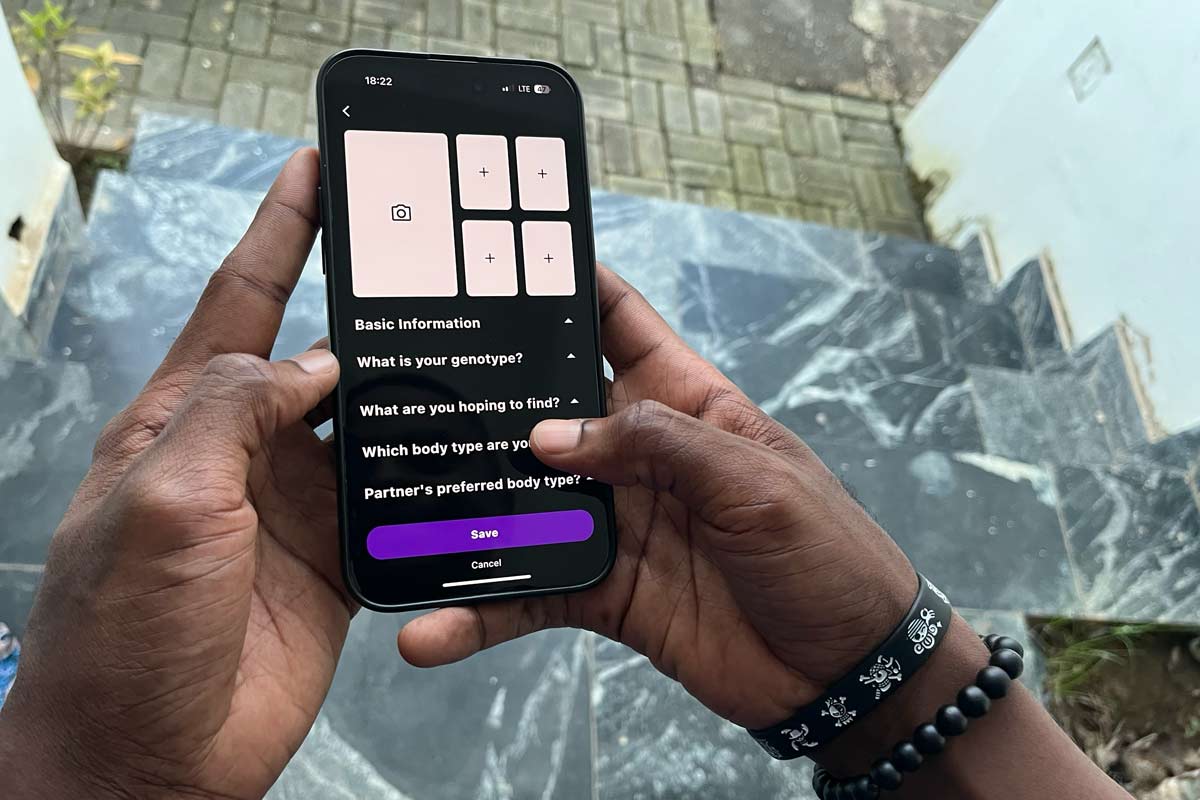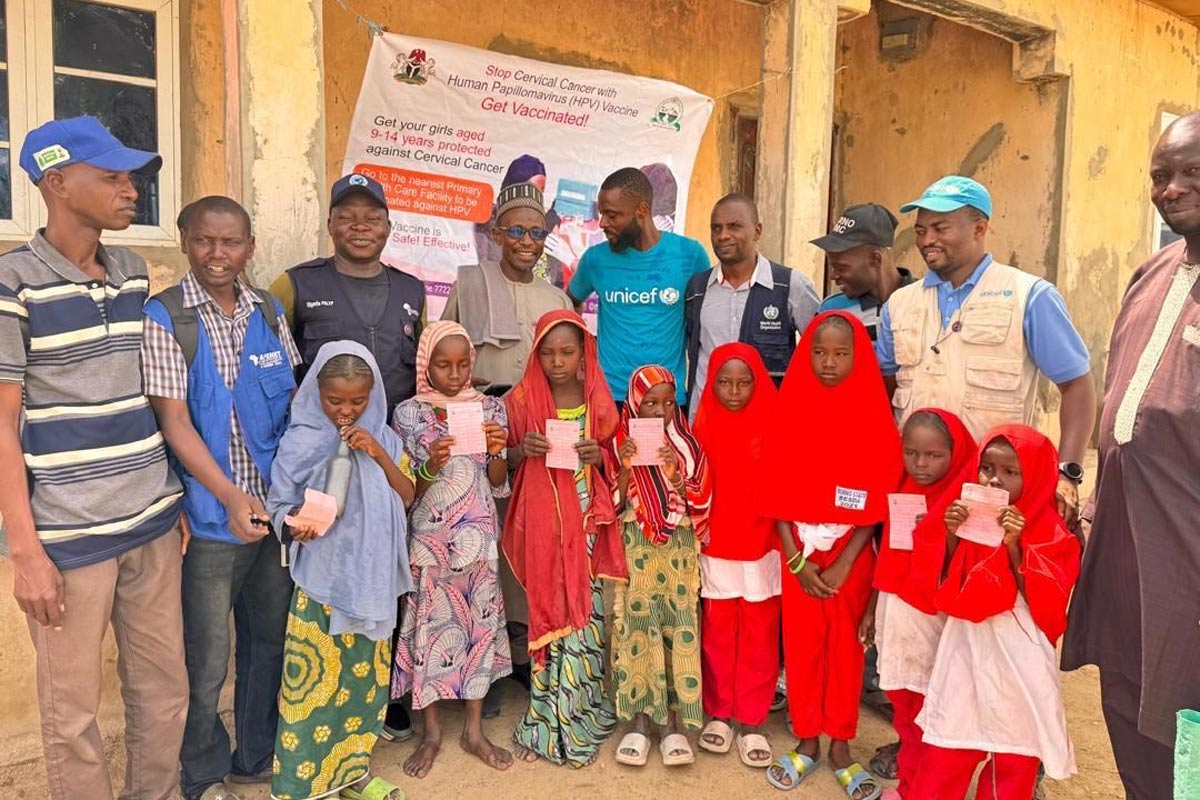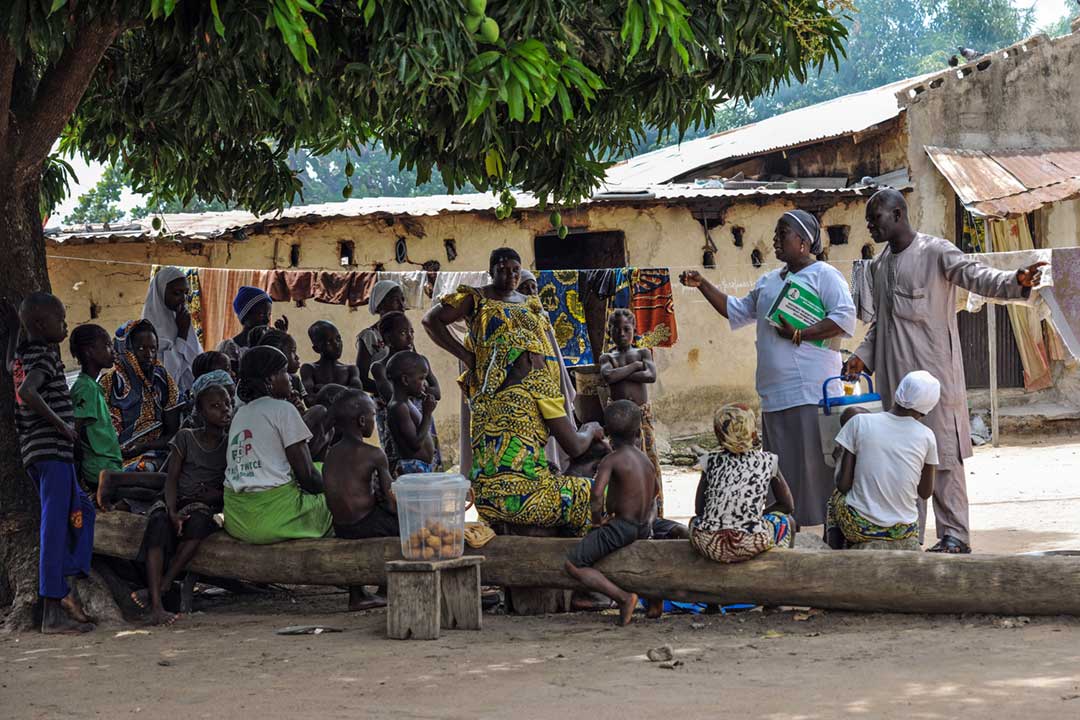Nigerian activists take on period poverty
Period poverty is a social, economic and health concern. It’s also largely ignored. In northern Nigeria, four young women are fighting to change that.
- 29 February 2024
- 7 min read
- by Zubaida Baba Ibrahim
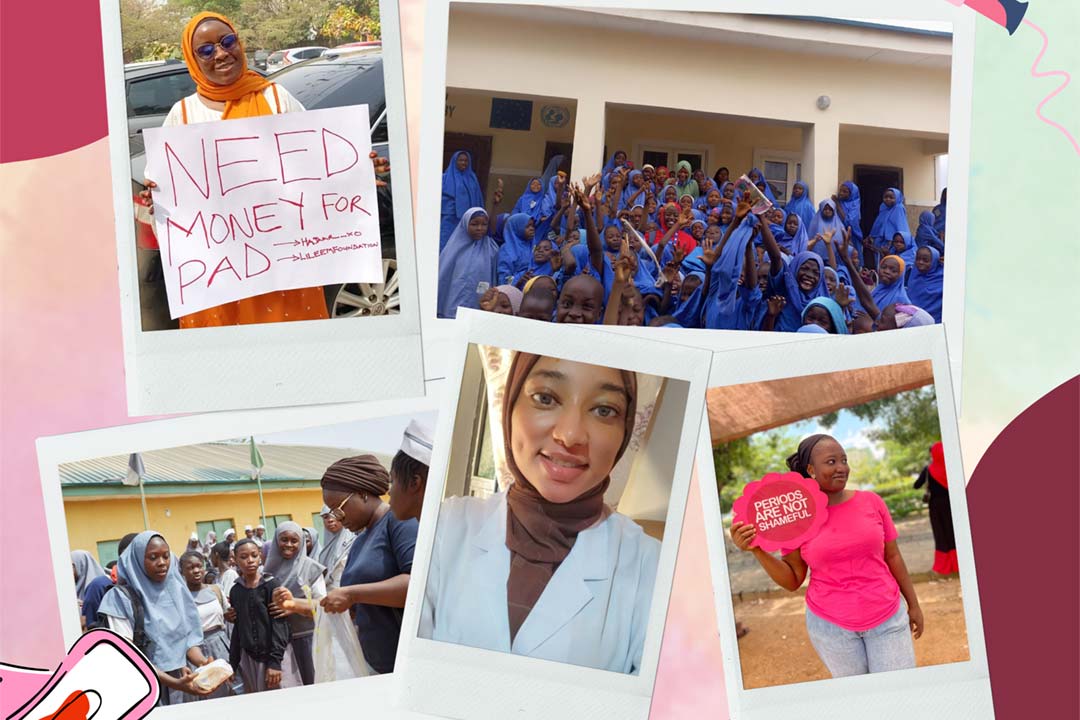
At Wuse Market, one of Nigeria's busiest, Hajara Husseini, 30, hoists a placard that reads, boldly, "NEED MONEY FOR PAD." Shoppers pause in their tracks – some offer her naira bills. By the end of the day, Husseini has netted 19,600 nairas – enough to buy more than a dozen packs of sanitary pads for women and girls who can't afford them.
"I have always wanted to make impactful change," Husseini says. In 2022, she joined a school outreach with an NGO during which she had "heartbreaking" conversations with women and girls affected by period poverty. "There and then, I told myself I wanted to be part of this cause – to empower girls and women."
“We have come to a point where getting three meals a day is a problem. So, getting disposable sanitary pads every month when the prices are being constantly hiked is a challenge. It’s the biggest thing that pushed me to start making reusable pads.”
– Maryam Muhammad, period poverty activist, Kano
In Nigeria, an estimated 37 million women and girls experience period poverty, meaning that they are unable to access or afford menstrual products like pads and tampons, but also pain medication and underwear. It's a situation that remains largely unaddressed within society, even as the escalating cost of sanitary pads over the past five years has made the problem worse, putting an essential product out of reach for a large portion of the population.
In addition to the material difficulties caused by period poverty, there is also a stigma attached to menstruation, particularly in more conservative northern parts of Nigeria. That stigma reinscribes social inequalities, says Husseini. "Period poverty and gender inequality definitely intersect, so the most important aspect of my advocacy is not just to distribute pads, but to provide a community with menstrual hygiene education."
Agitating for change in northern Nigeria
Husseini is part of a larger movement of women in northern Nigeria who are working to combat period poverty and the gender inequalities it perpetuates. Shamsiyya Ibrahim and Maryam Muhammed are also advocating in their respective cities of Kaduna and Kano in the northwest. Halima Yarima, in Borno, is leading the charge in the north-east, where she works with displaced women.
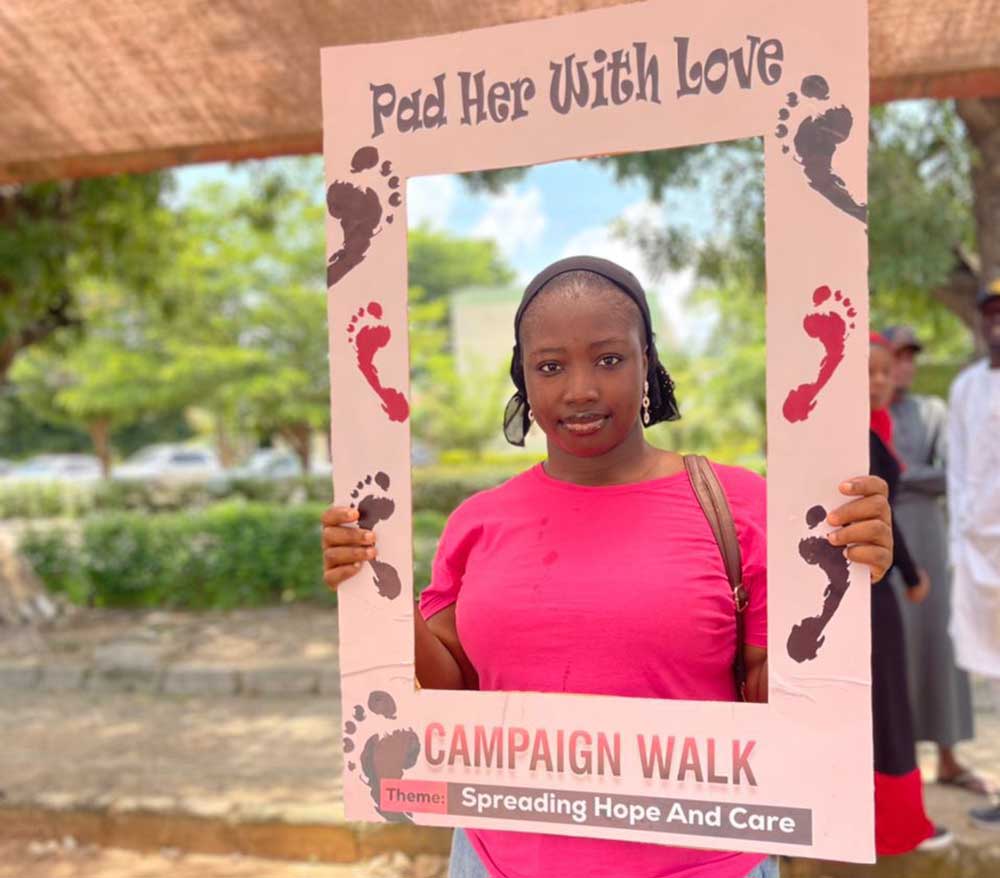
Credti: Shamiyya Ibrahim
All four women are driven by a restless civic conscience. "I have always wanted to have a charity organisation since the age of 16," Ibrahim, 23, says. "I have always wanted to do something for people that do not have [anything]."
For Ibrahim, who is still a university student, her current project started with a "random idea,", she says. "I just casually asked my friends: 'If I do this would you donate?' and they said, 'Oh! why not.' I went around my hostel asking girls to donate: it kinda started from there." She collected 35,000 nairas that day.
During the COVID-19 pandemic in Kano, Muhammed, 29, observed the scarcity of sanitary pads and its impact on women and girls. The lockdown left many shops and kiosks closed, making it difficult for women and girls to access safe period products.
While this posed a challenge for all women in her community, those from less privileged backgrounds were particularly hard-hit. Muhammed understands the need for safe period products as an essential need, so she took action.
Using bamboo fleece and cotton, Muhammad, who is a pharmacist, began making safe reusable sanitary pads that she donated to women who couldn't afford to purchase them.
"We have come to a point where getting three meals a day is a problem. So, getting disposable sanitary pads every month when the prices are being constantly hiked is a challenge. It's the biggest thing that pushed me to start making reusable pads."
Displaced women are especially vulnerable
In Borno state, where conflict has displaced over 1.7 million people, more than half of those displaced are women and girls. For them, lack of access to clean water and sanitation facilities, lack of privacy and safety, and increased vulnerability to gender-based violence are urgent concerns.
"Even when there are good toilet facilities in camps, women and girls often lack the privacy and space they need to manage their menstrual hygiene in a safe and dignified way," says Yarima, a 23-year-old resident of Maiduguri, the capital city of Borno, a landing place for many people fleeing conflict in the surrounding areas.
Have you read?
"In some camps, most of the girls complain that they have difficulties accessing [shared] toilets due to fear. When they go out, they are being harassed," Yarima says. This creates a major challenge for their reproductive health, she says, as they are unable to bathe and wash up properly during and after menstruation.
Yarima, who works with EME Foundation, a women's right organisations in Nigeria, fundraises for internally displaced women to get more access to clean water and safer sanitation facilities, educating displaced adolescent girls on how to safely use sanitary pads. "Also, how to change, how to wash themselves and how to safely dispose of used period products," she said.
Stigma drives real world
In Kano, Muhammed also educates her community about reproductive and sexual health. "The biggest barrier [to fighting period poverty] is what we call Kunya – shame. You don't have shame if you talk about periods in public. It's a societal barrier. We lack information, we lack knowledge, we lack guidance and part of what I do to break this barrier is to talk about it. I make videos, I talk to them in person."
In her work, Muhammed has faced verbal harassment, being called derogatory names: "They tag you 'Yar Iska', (wayward woman) and shameless."
Due to cultural beliefs and stigma, many tend to dispose of their used menstrual products in ways that pollute the environment, such as flushing them down the toilet or throwing them in the trash without proper packaging. These practices contribute to wider problems, like the contamination of water sources and other health hazards.
Ibrahim believes that the biggest challenge in addressing period poverty is the cultural beliefs and stigma that surround the issue. "During our last campaign when we were giving out pads to girls on the streets, we could clearly see that girls are too old to not be having their periods, but they would lie to us and say they have not started. And this is because of shame.
"In the northern part of the country, it's not something that you are expected to talk about. When you are on your period, you are supposed to hide it. You are not supposed to let anybody know, especially men," Ibrahim adds, stating that increasing public awareness about the issues surrounding periods, such as the health and economic consequences, will lead to the development of more effective responses.
“In the northern part of the country, it’s not something that you are expected to talk about. When you are on your period, you are supposed to hide it. You are not supposed to let anybody know, especially men.”
– Shamsiyya Ibrahim, period poverty activist, Kaduna
During one of Husseini's outreach events to a school, a student who participated came out to thank the organisation. "The little girl said, and I quote, 'Pay no mind to the boys who will laugh at us and call our pads Pampers. Let's remember that these people have told us that periods are not shameful and that they are normal.'" Husseini said she was deeply moved by it.
Awareness, policy intervention needed
Husseini recognises that many advocates and organisations are doing valuable work with raising awareness and responding to period poverty in their own capacity. But she also believes that more must be done to address its root causes.
She suggests that Nigeria's government ought to pass a bill that makes period products free for women that cannot afford them, "and partner with organisations like mine [that can] educate these women about menstrual hygiene."
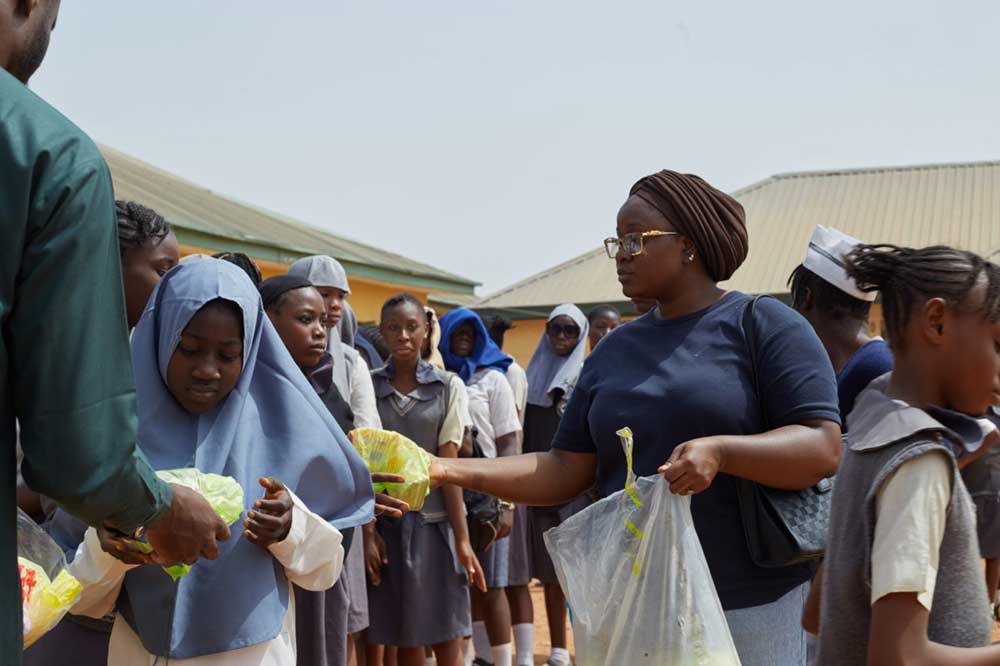
Credit: Hajara Husseini
Yarima suggests ensuring that menstrual products are affordable and accessible to all women and girls requires "making sure that schools and workspaces have the necessary facilities to support menstrual hygiene, and also providing comprehensive and accurate information, and including it into school curriculums to challenge the spread of taboos and stigmas."
Ibrahim says if not free, she would like to see menstrual products subsidised. This could be achieved through measures such as removing Value Added Taxes (VAT) and import taxes on menstrual products and distributing free products through schools and clinics. "Women go through this every month: why can we not walk into any clinic and get free period items?" she asks.
Ibrahim also calls for R&D into alternative, healthy options for managing menstrual cramps and other symptoms. "Almost all [current] options have side-effects."
Muhammed echoes Husseini, Yalima, and Ibrahim, adding that efforts should be made to reach girls who also attend Islamic schools with menstrual health education. She also suggests teaching girls to make their own reusable menstrual pads from soft, safe, and absorbent materials would help reduce period poverty, and encourage sustainable menstruation practices that have less impact on the environment.

